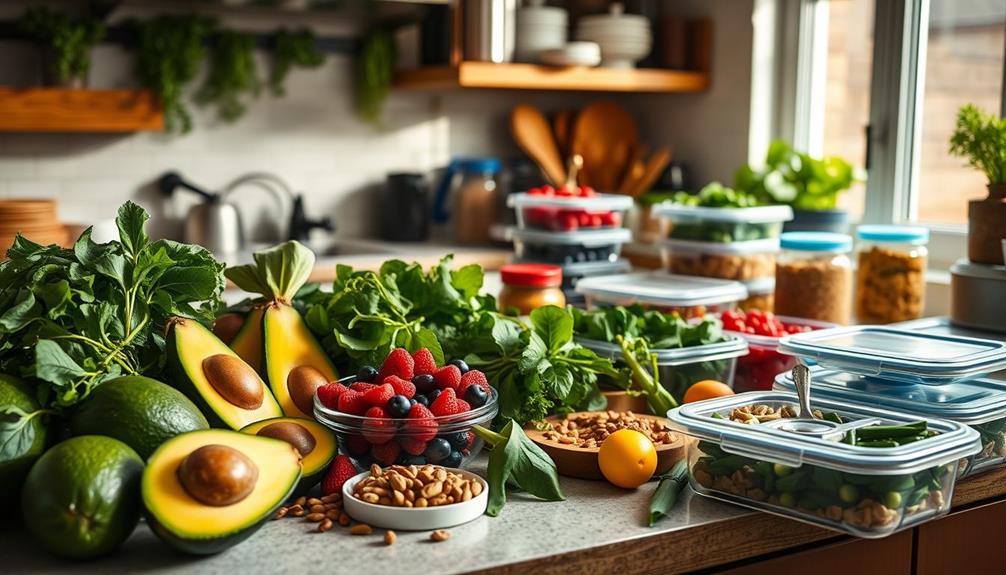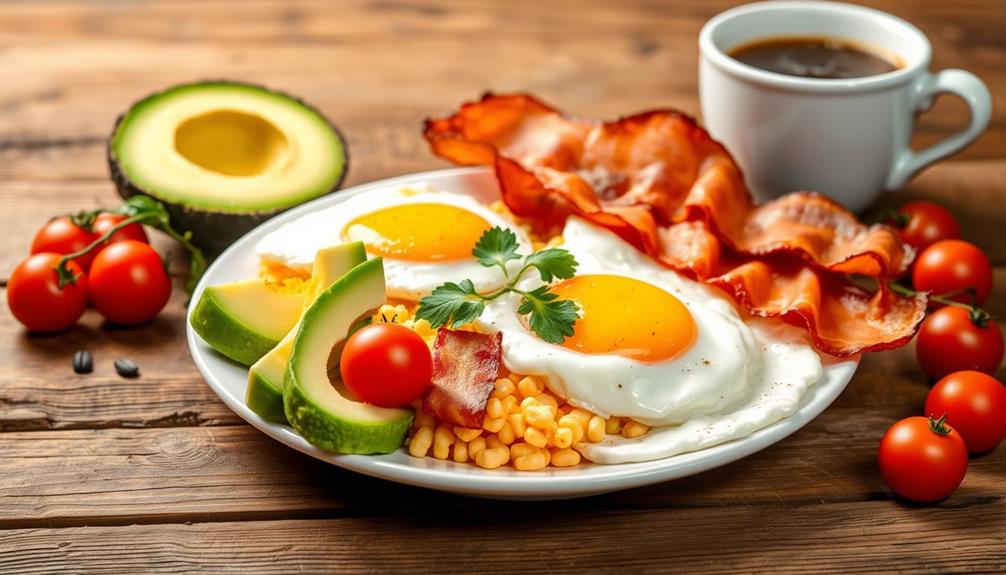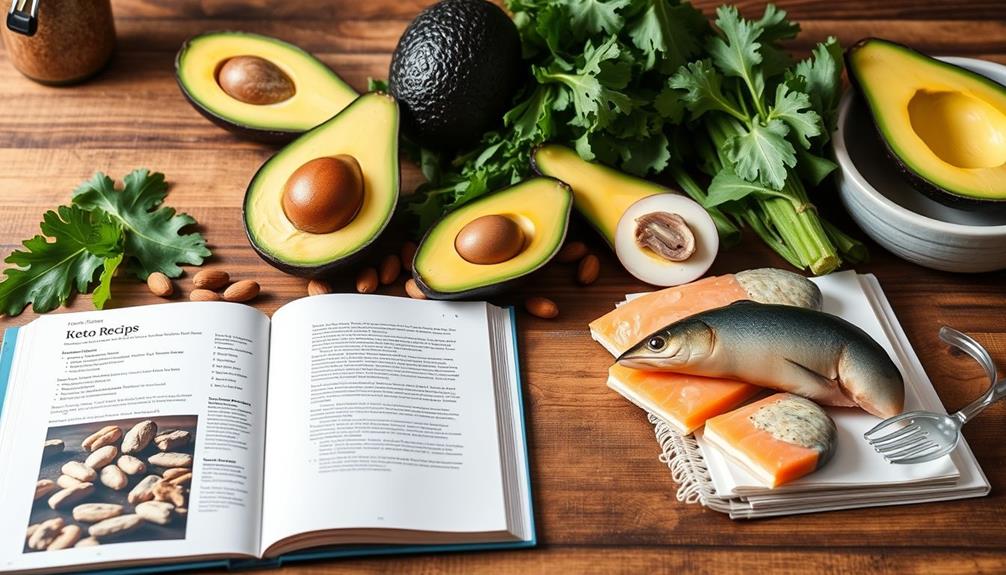If you're considering the keto diet during pregnancy, it's essential to tread carefully. While it can lead to weight loss and improved energy, the strict low-carb approach can also cause nutrient deficiencies important for your baby's development. Elevated ketone levels may impact fetal health, making a balanced diet necessary. You should increase your carbohydrate intake to include fruits and whole grains, focusing on nutrient-dense foods. Consulting healthcare professionals for personalized advice is key. By understanding these significant factors, you can better navigate the complexities of keto and pregnancy while ensuring a healthy outcome for both you and your baby.
Key Takeaways
- The keto diet may lead to nutrient deficiencies during pregnancy, impacting fetal development and maternal health.
- Consult healthcare professionals before starting or modifying the keto diet to ensure it meets pregnancy nutritional needs.
- Increasing carbohydrate intake with healthy sources is essential to support fetal growth while on a modified keto diet.
- Monitor ketone levels regularly to ensure safety for both mother and baby during the keto diet.
- Consider alternative dietary approaches, such as a balanced whole food or Mediterranean diet, for a well-rounded nutritional foundation.
Understanding the Keto Diet
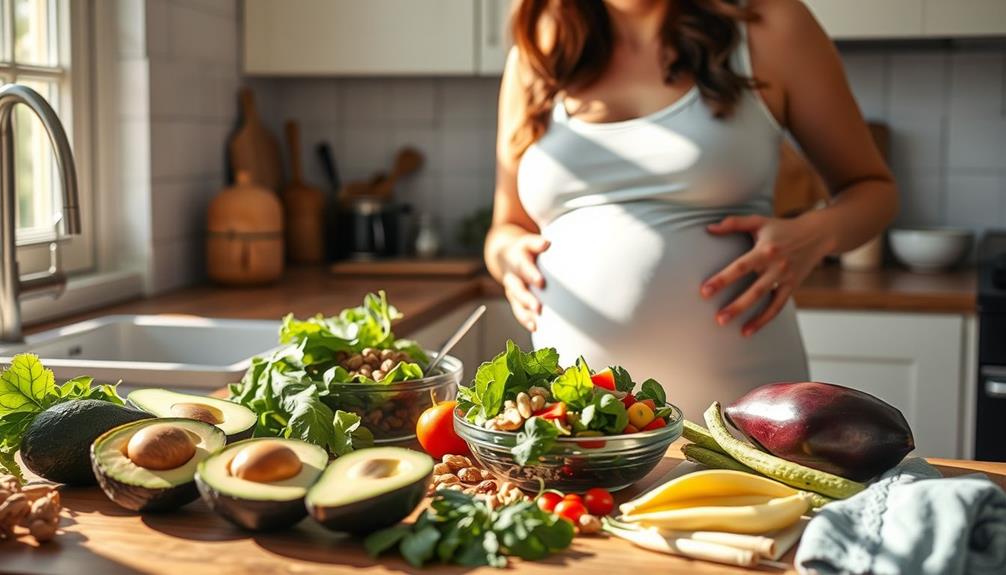
The Keto diet is a popular low-carbohydrate, high-fat eating plan that shifts your body into a state of ketosis, where it burns fat for fuel instead of carbs.
This dietary approach drastically reduces your carbohydrate intake while increasing your consumption of healthy fats. As a result, your body becomes more efficient at utilizing stored fat for energy.
You'll focus on foods like avocados, nuts, seeds, and fatty fish while limiting grains, sugars, and starchy vegetables.
It's essential to highlight that while the Keto diet can lead to weight loss, it may also come with potential side effects such as gastrointestinal discomfort, similar to what some experience during juice cleanses.
Adopting the Keto diet can lead to changes in your metabolism and may affect your energy levels and hunger cues.
It's vital to understand these shifts and how they impact your daily life before starting this eating plan, especially if you're considering it during pregnancy.
Benefits of the Keto Diet

Adopting the Keto diet can offer several benefits, particularly in weight management and energy levels. When you reduce carbohydrate intake, your body shifts to burning fat for fuel, which can lead to rapid weight loss. This approach often results in significant reductions in body weight, improving overall health and potentially alleviating conditions like PCOS.
Additionally, maintaining a balanced diet rich in whole foods is essential for ideal health during pregnancy, as it supports both your well-being and that of your developing baby effective strategies for weight loss.
You may also find increased energy levels as your body becomes more efficient at utilizing fat. Many people report enhanced mental clarity and focus, thanks to the stable energy provided by ketones.
Additionally, the Keto diet may improve insulin sensitivity and reduce inflammation, further contributing to your well-being. These benefits can be appealing, but remember to consult a healthcare professional before making any drastic dietary changes, especially during pregnancy.
Risks During Pregnancy
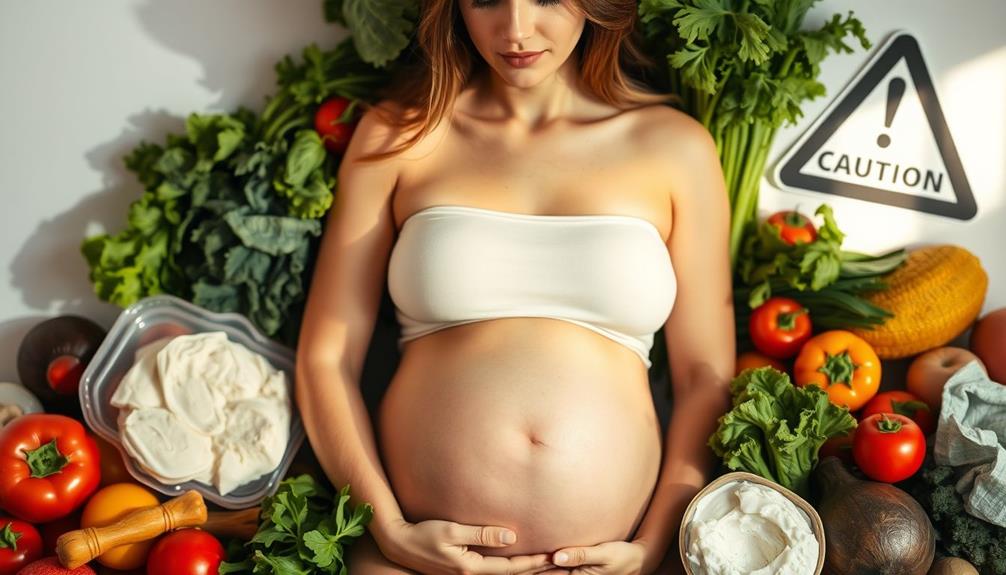
While the Keto diet can offer benefits, it also presents several risks during pregnancy that you need to be aware of. One major concern is nutrient deficiencies, as the strict low-carb approach may limit your intake of essential vitamins and minerals important for fetal growth.
Additionally, maintaining a balanced diet is important for early detection of complications, similar to how mammography guidelines suggest proactive health measures. You might also face issues with elevated ketone levels, which could affect your baby's development.
Moreover, excessive weight loss during pregnancy can conflict with your nutritional needs, potentially leading to complications. It's important to understand that a balanced intake is essential for both you and your baby.
Consulting with a healthcare professional is necessary to navigate these risks effectively and guarantee you're meeting the nutritional demands of your pregnancy.
Modifying the Keto Diet

Modifying the Keto diet during pregnancy is fundamental to guarantee both your health and that of your growing baby. It is important to consult with a healthcare professional before making any changes to your diet during pregnancy, including the Keto diet. It may be necessary to make modifications to ensure that you are still receiving essential nutrients like folate and iron. However, it is still possible to maintain a healthy and balanced Keto diet during pregnancy by focusing on high-quality protein sources such as lean meats, eggs, and dairy, as well as plenty of non-starchy vegetables. These protein benefits for achieving ketosis can help support the health and development of both you and your baby.
You'll want to increase your carbohydrate intake to meet the nutritional demands of pregnancy. Focus on healthy carbohydrate sources, like fruits and whole grains, while prioritizing nutrient-dense foods necessary for fetal development.
Pay close attention to your ketone levels, as maintaining safe levels is essential for your well-being. Consulting with a healthcare professional is a must for personalized dietary adjustments.
They can help you navigate the changes while ensuring you get the crucial nutrients your body and baby need.
Nutritional Guidance for Moms

Nutritional guidance for moms during pregnancy is essential for supporting both your health and your baby's development. Here are some key tips to follow:
- Consult with Healthcare Professionals: Always talk to your doctor or a nutritionist for personalized advice tailored to your needs.
- Prioritize Nutrient-Dense Foods: Focus on whole foods rich in vitamins and minerals, like leafy greens, lean proteins, and healthy fats.
- Listen to Your Body: Pay attention to your hunger cues and cravings; they can guide you toward what your body needs.
- Stay Hydrated: Drink plenty of water throughout the day to support digestion and overall health.
Monitoring Health and Nutrition

Monitoring health and nutrition during pregnancy is essential for ensuring both your well-being and the healthy development of your baby.
You should regularly track your nutrient intake, focusing on essential vitamins and minerals important for fetal growth. Use food diaries or apps to help you stay organized.
It's important to listen to your body's hunger cues and cravings, adjusting your diet accordingly to meet your needs. Staying hydrated also plays a significant role in supporting your overall health.
Consulting with healthcare professionals can provide personalized guidance tailored to your unique situation, helping you make necessary dietary adjustments.
Alternative Dietary Approaches
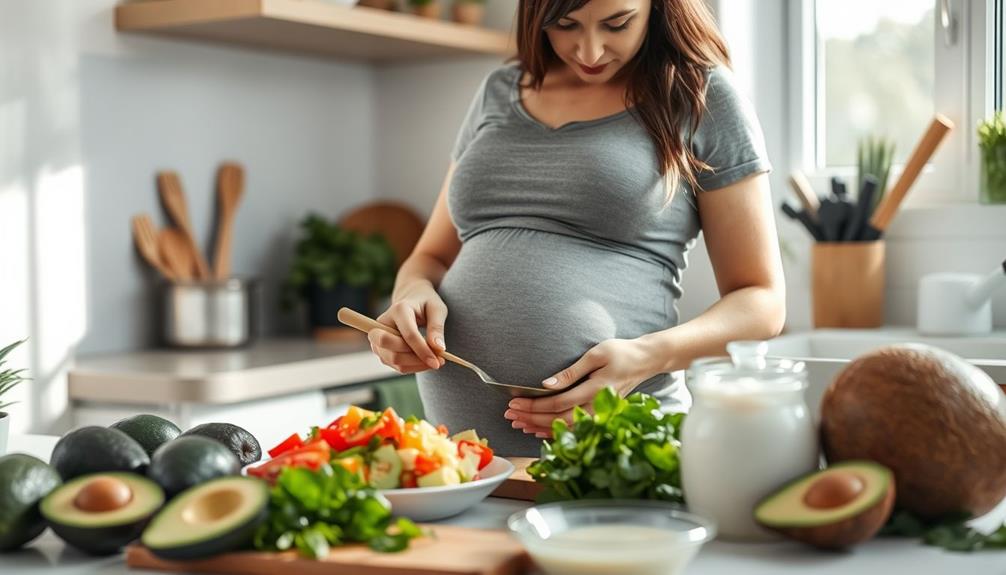
When considering your dietary options during pregnancy, exploring alternative approaches can be beneficial for both your health and your baby's development.
Here are some alternative dietary approaches you might find helpful:
- Balanced Whole Food Diet: Focus on whole, unprocessed foods to guarantee you get essential vitamins and minerals.
- Mediterranean Diet: Emphasizes healthy fats, lean proteins, and plenty of fruits and vegetables, supporting both maternal and fetal health.
- Plant-Based Diet: Incorporate a variety of plant foods to provide nutrients while reducing potential risks associated with high animal fat intake.
- Mindful Eating: Pay attention to hunger cues and eat intuitively, guaranteeing you meet your body's nutritional needs without strict restrictions.
These approaches can provide a well-rounded nutritional foundation during this vital time.
Frequently Asked Questions
Can I Start the Keto Diet Before Pregnancy?
You can start the keto diet before pregnancy if you're looking to lose weight or improve your health.
It's a low-carb, high-fat approach that can boost energy and enhance cognitive function.
However, it's crucial to guarantee you're getting enough nutrients to support your body.
Consider consulting a healthcare professional to help you navigate the diet effectively and maintain a balanced intake of vitamins and minerals for peak health.
What Are Common Symptoms of Ketosis During Pregnancy?
When you're in ketosis, you might experience some common symptoms, like fatigue, headaches, or nausea.
You may also notice increased thirst and dry mouth as your body adjusts.
Some people feel more focused or energetic, while others might struggle with mood swings.
It's important to listen to your body and stay hydrated.
If these symptoms become overwhelming, consider adjusting your diet or consulting a healthcare professional for personalized advice.
How Does Keto Affect Breastfeeding?
Breastfeeding's like a delicate dance, and your diet can influence that rhythm.
If you're following a Keto diet, it may affect your milk supply and composition. While some moms report increased energy, others find their milk's fat content changes.
It's crucial to stay well-hydrated and guarantee you're getting enough nutrients. Consulting with a healthcare professional can help you navigate any potential issues and make certain both you and your baby thrive.
Can I Eat Dairy on a Modified Keto Diet?
Yes, you can eat dairy on a modified keto diet!
Dairy products like cheese, butter, and cream are great sources of healthy fats and can fit well into your meal plan. Just be mindful of your overall carbohydrate intake.
Opt for full-fat options and consider your personal tolerance, as some people may have sensitivities to lactose.
Always choose nutrient-dense dairy to help meet your dietary needs while enjoying delicious flavors.
What Snacks Are Safe on a Keto Diet During Pregnancy?
Imagine a treasure chest filled with delicious, nutrient-dense snacks that keep you energized and satisfied.
On a keto diet, you can enjoy avocado slices drizzled with olive oil, crunchy nuts like almonds or walnuts, and cheese cubes that melt in your mouth.
Hard-boiled eggs are a perfect grab-and-go option, too.
Just remember to balance your choices to guarantee you're nourishing both yourself and your little one while enjoying these tasty treats!
Conclusion
While the Keto diet might seem appealing for weight management, remember that your body's needs during pregnancy are unique. It's natural to worry about missing out on the benefits of Keto, but focusing on a balanced, nutrient-rich diet can support both your health and your baby's development. Embrace this special time by prioritizing wholesome foods and staying informed, so you can enjoy your pregnancy journey without the stress of strict dietary rules. Your little one deserves the best!

